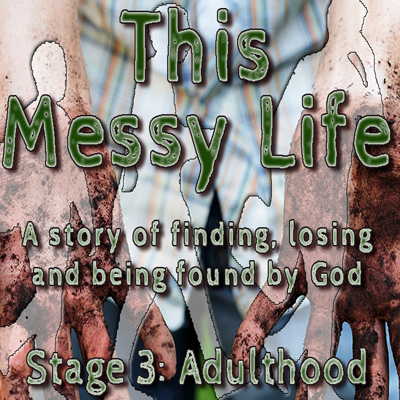THIS MESSY LIFE: BECOMING AN ADULT - PART 4
WHAT IF MOM AND DAD WERE RIGHT?
Sunday, November 24, 2019
2 Kings 22:1-10 (14-20), 23:1-3
Go and ask the Lord on my behalf, and on behalf of the people, and on behalf of all Judah concerning the contents of this scroll that has been found. The Lord must be furious with us because our ancestors failed to obey the words of this scroll and do everything written in it about us…
…Because your heart was broken and you submitted before the Lord when you heard what I said about this place and its citizens—that they will become a horror and a curse—and because you ripped your clothes and cried before me, I have listened to you, declares the Lord. That’s why I will gather you to your ancestors, and you will go to your grave in peace. You won’t experience the disaster I am about to bring on this place.
2 Kings 22:13, 19-20
Sometimes you can’t outrun consequences. Sometimes we look at all the things we’ve done in life to try to make up for our mistakes, to repent, to seek forgiveness from those we’ve hurt, to make amends, and none of it seems to matter. We still have regrets. Some relationships are never fully reconciled. The things we have lost by our own poor choices may never be regained. We may let go and move forward having learned many valuable lessons, but the consequences stay with us no matter what.
By the time we get to King Josiah, the consequences of Israel’s sin were certain. Nothing could stop the coming disaster of exile they would face. The wheels were already in motion. Yet in 2 Kings 22:20 we read that Josiah will not experience the disaster that is coming. Somehow the consequences will be delayed and he will be spared. Why?
If we go back to verse 13 we see that Josiah’s priest came across a scroll in the process of renovating and cleaning out the temple. Some have said this is the scroll of Deuteronomy while others say it only includes a partial list of the God’s instructions, but either way, this scroll clearly contained the Word of the Lord. What’s more, Josiah quickly realizes that the people have not obeyed these particular instructions for quite some time. “The Lord must be furious with us,” he says, “because our ancestors failed to obey.”
Josiah’s reforms do not ultimately prevent the exile, but his faithfulness to this re-discovered law spared him and potentially his entire generation from suffering the worst of those consequences. At least for a short time, Josiah broke the cycle of sin and idolatry that previous generations had perpetuated.
Most of us have had moments in our adult lives when we look back and realize our parents were right about more than we care to admit. That doesn’t mean they were always right, and sometimes like Josiah, we may have to go back a few generations to find a faithful role model for our spiritual lives. We may even have to look to other families. Regardless of the source, Josiah reminds us that we are not the first generation trying to figure out how the Scriptures apply to our everyday lives. There are many lessons to be learned from the past, both in how to live and how not to live. For Josiah, the first lesson was how not to live. We cannot continue in the idolatry of our ancestors. And yet in the scroll he discovered the promises of God that dated back generations and he came to understand that those promises were just as real in his day as they ever had been. God is faithful in every generation.
We may not be able to stop the decline of a denomination or even a congregation. We may not be able to prevent the exile that is already in process. But we can choose how we will live in the face of these consequences. For ourselves, our families, our communities and our generation, we can choose life, so that our descendants might live faithfully in the place God has for them. No matter what consequences haunt us from our past, we can choose this day to serve the Lord.
I call heaven and earth as my witnesses against you right now: I have set life and death, blessing and curse before you. Now choose life—so that you and your descendants will live — by loving the Lord your God, by obeying his voice, and by clinging to him. That’s how you will survive and live long on the fertile land the Lord swore to give to your ancestors: to Abraham, Isaac, and Jacob.
Deuteronomy 30:19-20
So now, revere the Lord. Serve him honestly and faithfully. Put aside the gods that your ancestors served beyond the Euphrates and in Egypt and serve the Lord. But if it seems wrong in your opinion to serve the Lord, then choose today whom you will serve. Choose the gods whom your ancestors served beyond the Euphrates or the gods of the Amorites in whose land you live. But my family and I will serve the Lord.
Joshua 24:14-15









